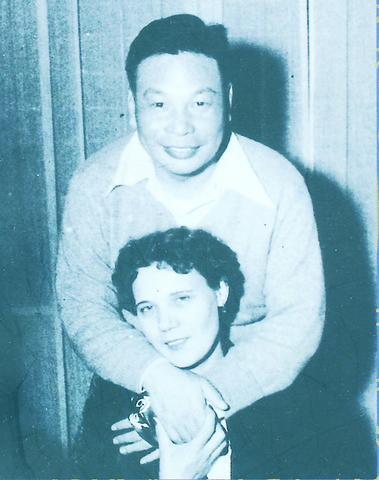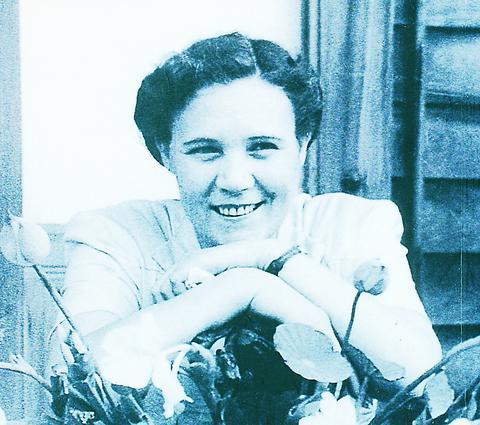Faina Epatcheva Vahaleva (
Born on May 15, 1916, in a mountainous area in the Russian city of Sverdlovsk (now Ekaterinburg), Vahaleva was first lady from 1978 to 1988, when Chiang Ching-kuo, the son of Chiang Kai-shek (蔣介石), served as Taiwan's president.

PHOTO: COURTESY OF CHINA TIMES PUBLISHING COMPANY
Though becoming a member of what was then China's most powerful family at a young age, Vahaleva had never attracted as much media spotlight as other members of the family. In the period of more than half-a-century since she set foot in Taiwan after Chiang Kai-shek's KMT government fled in 1949, the public's impression of the former first lady was ambivalent. The public knew that she was Chiang Ching-kuo's Russian wife and the mother of four children. But apart from that, her life and what kind of a person she was remained as mysterious as highly guarded intelligence secrets.

PHOTO: COURTESY OF CHINA TIMES PUBLISHING COMPANY
Unlike the lonesome, melancholy and feeble person that the public saw in her during her rare public appearances, young Vahaleva was extroverted, passionate and enjoyed outdoor activities. She was also an active and outspoken member of the Soviet Union's Communist Youth League.
Orphaned at young age, she was raised by her elder sister, Anna. After graduating from a training school for workers, she and her sister both landed jobs in the Ural Heavy Machinery Plant in 1932. In 1933, she became acquainted with Chiang Ching-kuo and they were married on March 15, 1935.
In October 1925, Chiang Ching-kuo went to study in Moscow at the age of 15. Chiang Kai-shek's countenance was believed to have been aimed at securing political interests and cementing ties with the Soviets. But as relations strained between Chiang Kai-shek and the Soviets, Chiang Ching-kuo's life in the communist country suffered.
The complexity of politics was beyond Vahaleva's control but she stood by Chiang Ching-kuo to endure the economic hardship, becoming his soul mate and only source of support in Russia. When the plant discharged Chiang Ching-kuo from his duties under the communists' order in September 1936, Vahaleva was, for six months in 1936 and 1937, the bread-winner of the family, supporting her husband and their son, Alan (
Following the Sian Incident (西安事變) of December 1936, Soviet leader Josef Stalin finally granted Chiang Ching-kuo his request to return to China.
Warmly received by Chiang Kai-shek and his wife Soong Mayling (宋美齡), Vahaleva was sent with Chiang Ching-kuo back to his hometown of Hsikou, Chekiang, to live with Chiang Ching-kuo's mother, Mao Fu-mei (毛福梅) and to learn Chinese. But because she was surrounded by people who spoke the local Ningbo dialect, she just learned to speak the dialect instead of Mandarin. Notwithstanding the language and cultural barriers, Vahaleva made efforts to adapt herself to her new role and the strange environment. She got along well with Mao but was not spoiled by comfort. Instead of relying on servants and maids, she insisted on doing the cooking and housework herself like traditional Chinese housewives. Their neighbors often saw her doing the family laundry or going shopping by bike.
Throughout Chiang Ching-kuo's decades-long political career, it was only during their time in southern Kiangsi that Vahaleva played a somewhat active part in Chiang Ching-kuo's public life.
In the spring of 1938, Chiang Ching-kuo was sent by his father to serve as an administrative officer in southern Kiangsi as part of his leadership training. He soon earned the reputation of having the audacity to challenge corrupt KMT officials and for hard work. He enjoyed mingling and exchanging views with young people. He often invited his colleagues and friends to his rather ordinary house where Vahaleva played hostess to the guests.
Chiang Ching-kuo, then young and energetic, was ambitious in pursuing his political career. As the positions he was assigned to were not yet sensitive in nature, he encouraged Vahaleva to assist with his job and she enjoyed engaging in the tasks to which Chiang Ching-kuo assigned her -- mostly related to women's and children's welfare.
But while Vahaleva's years in southern Kiangsi were some of the most colorful and fulfilling in her married life, she was deeply hurt by her husband's infidelity. Among Chiang Ching-kuo's numerous confirmed and unconfirmed extramarital relationships, one of the most noted was his affair with one of his assistants, Chang Ya-jo (章亞若). Chang gave birth to twin boys, John Chang (章孝嚴) and Chang Hsiao-tzu (章孝慈), in 1943.
Though the affair ended following the sudden and mysterious death of Chang Ya-jo in 1943, it nonetheless cast a shadow over the family for decades. Chiang Ching-kuo had never admitted any rumors concerning his much speculated extramarital relationships, and Vahaleva never publicly spelled out her feelings about the betrayal. But handling relations between the Chiang family and Chiang Ching-kuo's two illegitimate sons was a thorny issue for family for decades.
The way Vahaleva resigned herself to her husband's infidelities -- similar to how Chiang Ching-kuo's mother dealt with Chiang Kai-shek's countless extramarital relationships and eventual marriage with Soong -- exemplified how thoroughly she had internalized the traditional role of a Chinese wife.
More recently, media hype over the legal recognition of the Chang brothers as offspring of the Chiang family hurt Vahaleva.
Vahaleva's role as first lady was like no other in Taiwan's history. Partly because of the political sensitivity associated with her foreign origin and partly because of Chiang Ching-kuo's prohibition of her intervening in political affairs, Vahaleva never really performed the ceremonial role that a first lady has traditionally been assigned.
Furthermore, her stature as first lady paled even more when compared with the influence of her legendary mother-in-law, Madame Chiang. Soong Mei-ling's assertiveness and dominance both within the Chiang family and over Taiwan's political scene under the KMT's authoritarian regime was such that she became "the ever-lasting first lady."
But the lack of public exposure and fame didn't seem to bother Vahaleva much. She managed to repress her feelings for her homeland for decades and endured severing all ties with Russia. She was content to be an average housewife and surrounded by her husband and children.
Vahaleva's humble wish was shattered, however, by the death of Chiang Ching-kuo on Jan. 13, 1988, soon followed by the death of their three sons -- Alan in April 1989, Hsiao-wu (
With health problems worsening, Vahaleva became withdrawn and shut herself away in her empty Chihei residence in Taipei's suburban Taichih district.
Vahaleva's only daughter, Hsiao-chang (
In her own resilient and low-profile way, Vahaleva has served as a unique model for the women of the Chiang family -- to stand quietly and firmly by their husbands and sacrifice themselves for the family's sake -- just like what traditional Chinese society expects of a wife and a mother.

A preclearance service to facilitate entry for people traveling to select airports in Japan would be available from Thursday next week to Feb. 25 at Taiwan Taoyuan International Airport, Taoyuan International Airport Corp (TIAC) said on Tuesday. The service was first made available to Taiwanese travelers throughout the winter vacation of 2024 and during the Lunar New Year holiday. In addition to flights to the Japanese cities of Hakodate, Asahikawa, Akita, Sendai, Niigata, Okayama, Takamatsu, Kumamoto and Kagoshima, the service would be available to travelers to Kobe and Oita. The service can be accessed by passengers of 15 flight routes operated by

MORE FALL: An investigation into one of Xi’s key cronies, part of a broader ‘anti-corruption’ drive, indicates that he might have a deep distrust in the military, an expert said China’s latest military purge underscores systemic risks in its shift from collective leadership to sole rule under Chinese President Xi Jinping (習近平), and could disrupt its chain of command and military capabilities, a national security official said yesterday. If decisionmaking within the Chinese Communist Party has become “irrational” under one-man rule, the Taiwan Strait and the regional situation must be approached with extreme caution, given unforeseen risks, they added. The anonymous official made the remarks as China’s Central Military Commission Vice Chairman Zhang Youxia (張又俠) and Joint Staff Department Chief of Staff Liu Zhenli (劉振立) were reportedly being investigated for suspected “serious

ENHANCING EFFICIENCY: The apron can accommodate 16 airplanes overnight at Taoyuan airport while work on the third runway continues, the transport minister said A new temporary overnight parking apron at Taiwan Taoyuan International Airport is to start operating on Friday next week to boost operational efficiency while the third runway is being constructed, the Ministry of Transportation and Communications said yesterday. The apron — one of the crucial projects in the construction of the third runway — can accommodate 16 aircraft overnight at the nation’s largest international airport, Minister of Transportation and Communications Chen Shih-kai (陳世凱) told reporters while inspecting the new facility yesterday morning. Aside from providing the airport operator with greater flexibility in aircraft parking during the third runway construction,

Taiwanese and US defense groups are collaborating to introduce deployable, semi-autonomous manufacturing systems for drones and components in a boost to the nation’s supply chain resilience. Taiwan’s G-Tech Optroelectronics Corp subsidiary GTOC and the US’ Aerkomm Inc on Friday announced an agreement with fellow US-based Firestorm Lab to adopt the latter’s xCell, a technology featuring 3D printers fitted in 6.1m container units. The systems enable aerial platforms and parts to be produced in high volumes from dispersed nodes capable of rapid redeployment, to minimize the risk of enemy strikes and to meet field requirements, they said. Firestorm chief technology officer Ian Muceus said